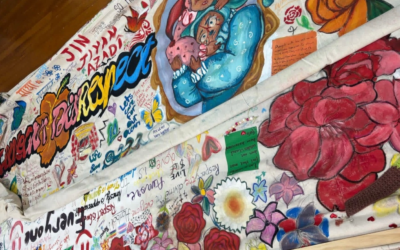How good are your “shopping on a budget” skills? Have you explored your local op-shop yet? To make sure that all of us get to discover the true treasures op shops hold, and to encourage people to reduce waste, Blacktown City Council recently hosted a “Recycled Wardrobe Tour.”
On 18 November this year, more than 30 people participated in this event, visiting several different second-hand stores to recycle and swap clothes. These workshops are held every three months by the council to introduce new initiatives to save landfill waste. Alessandra, one of the attendees saw this event as a chance to explore her options and learn more about different trends.
“Seeing these clothes gave me some [new] ideas, especially talking with the fashion designer was very useful,” said Alessandra.
As part of the event, Blacktown City Council also brought forward designer and stylist Laura Cross, to help guests try and match different styles of clothing.
When asked why a lot of young people don’t consider op-shopping, Laura said, “It’s a generational difference, and in my generation, this was all we did.”
“I think it’s the connotations of ‘that’s where poor people go’ or that people still may want to look the same and not want to stand out too much, is why the younger generation tends to look the other way when it comes to second-hand shopping.”
Shopping with op-shops certainly brings a different level of exclusivity to the attendees, as they not only save money but also get to explore different styles of fashion.
According to the ABC’s War on Waste, Australia spends $5 billion on fashion a year and throw out 6000 kilograms of clothes/textiles every 10 minutes. On average, it takes 5700 litres of water to make one pair of jeans and 2700 litres of water to make one cotton t-shirt.
Recycled clothes however, are often much cheaper than new clothing found in standard retail shops, and have less of an impact on the environment. The Restore in Seven Hills is an op-shop that sells recycled clothing and accepts clothing donations. Neralie Want, one of the staff members for The Restore, says that they’re able to restock the store every two weeks, “Thanks to the donations we’ve received.”
“We also get to build a community with the people who come to the store and actually help each other,” said Neralie. “The cost is a huge benefit for customers. You’re not paying retail price. And you wouldn’t get something here that everyone else is wearing.”
Some op-shops even give student discounts such as one by the Salvation Army where students get 20 per cent off every Saturday,
Even if the idea of op shopping doesn’t sound appealing to you, it’s worth exploring such workshops to learn more about it. Attendees learn more about different fashion trends, the quality and types of clothing, and get to match their clothes. Perhaps next time you need to clear out your wardrobe, consider donating your clothes to your local charity clothing bin and stock up on new clothes by buying something pre-loved.
Text: Nancy Upadhya and Erielle Sudario
Photography: Erielle Sudario












